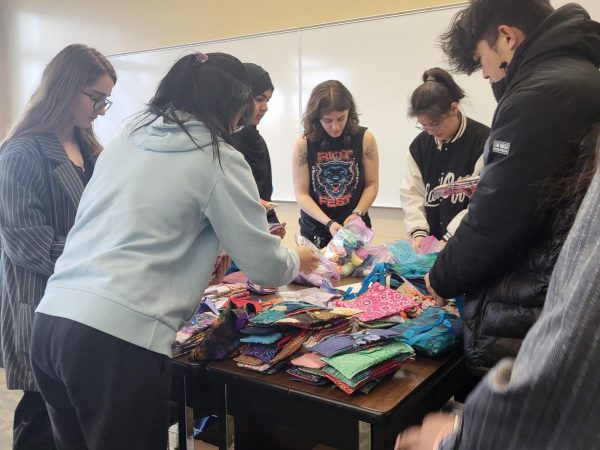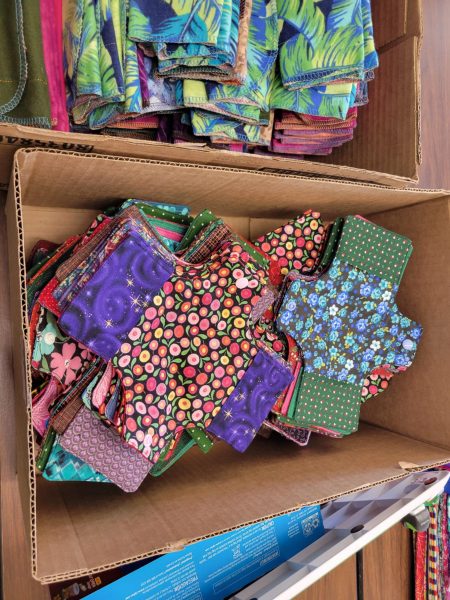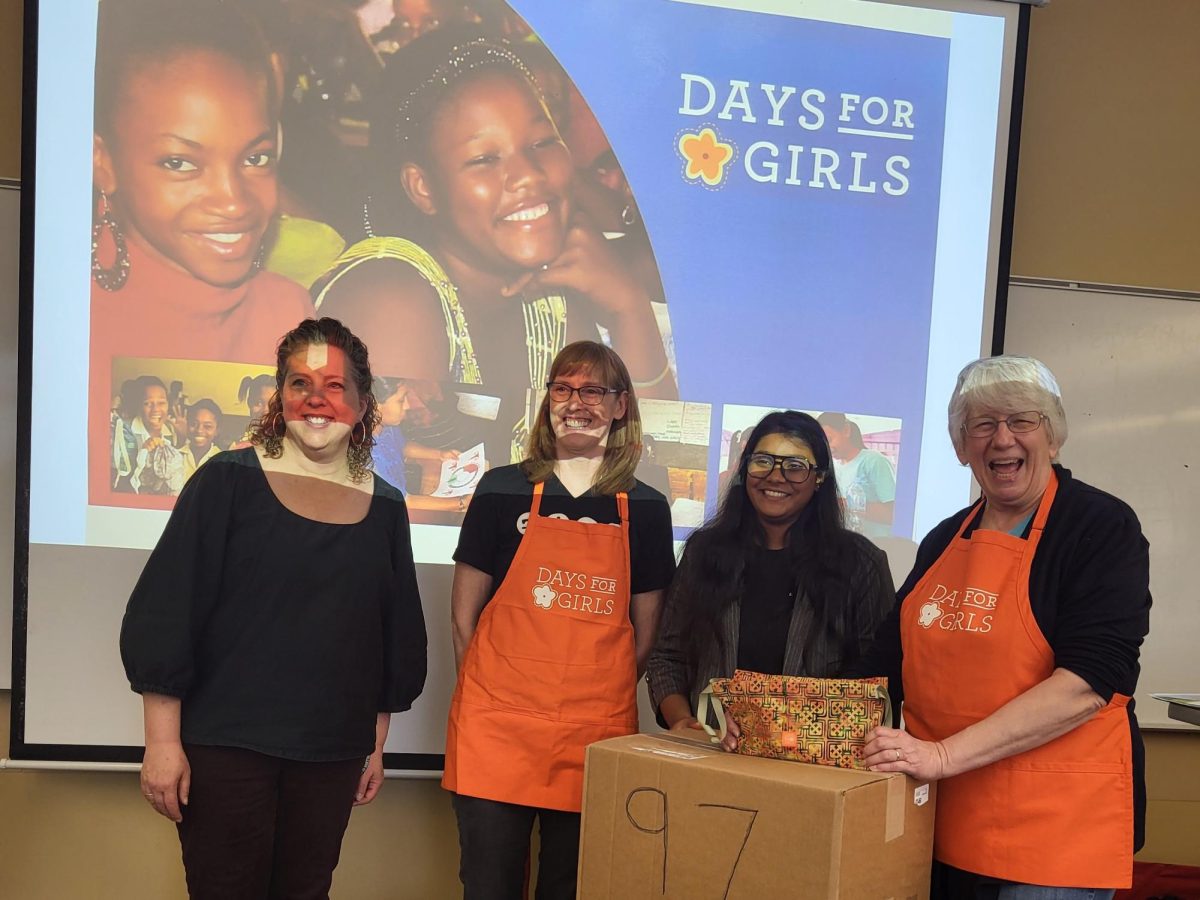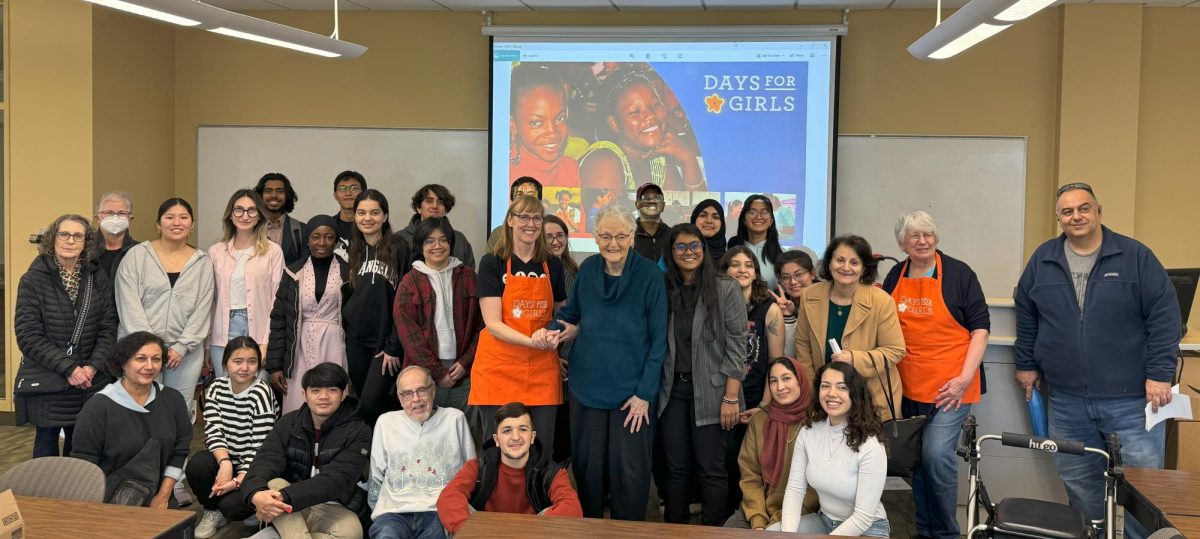On a busy Friday afternoon, students gathered to assemble care packages of sanitary products to donate to local pantries and shelters. The event was led by student Masuda Moutushi, who is a cybersecurity major and the secretary of UNICEF club. They assembled 97 packages within an hour, which included special reusable cloth pads that are sewn and designed by international non-profit Days for Girls. The group partnered with Moutushi for her community impact project, where she sought to combat period poverty and encourage menstrual health for low-income women.

Moutushi was joined by students from COD’s UNICEF student chapter, Feminist Alliance, Girl Up and the CCI program, with about 30 volunteers in all. Anam Sultana, president of UNICEF club, was among the volunteers.
“We work to educate students on campus about issues children are facing worldwide, such as poverty, which is why we are part of the Days for Girls initiative today,” Sultana said. “I think this perfectly aligns with UNICEF’s mission to create a more equitable society, as girls are also a very important part of society.”
The majority of the volunteers at the event were girls and women.
“As a girl who goes through this cycle every month along with all the mood swings and cramps we have to deal with, I find it absolutely wild that there are girls out there who do not have access to this basic necessity, which is very important for our health and wellbeing,” Sultana stated. “Someone’s social status or income level should not be a reason for them to not have access to something as essential as sanitary pads that are a vital part of women’s life.”
Moutushi led the event, with guidance from Sandi Helm, who is the program director of Dignity for Girls, a partner organization of Days for Girls for donating menstrual products worldwide. Moutishu began the project by visiting clients of the Family in Faith Food Pantry in Glendale Heights, Ill., to assess the need for menstrual products.
“Most of the people who visit the pantry are refugees and unfamiliar with local systems, which makes accessing sanitary products a daunting task,” Moutushi said. “The food pantry we will be working with shared that disposable period products are rarely donated and available.”
Helm said female clients commonly express a great need for self-care items.

“We showed them the washable product and asked them if they would use it, and seven out of 10 of them said they would,” Helm recalled. “Three or four of them were overjoyed, asking how much would it cost if they could have one. ”
Helm went on to talk about how Dignity for Girls volunteers from around Illinois sew the washable cloth pads, organize donation shipments and personally visit countries in need around the world. People can sponsor a sewing machine for $275 and fabric for one hygiene kit for $10. Based on Moutushi and Dignity for Girls’ assessment of local food pantries and women’s shelters, menstrual products are very expensive for many low-income people.
“In the United States, where such products can be prohibitively expensive, navigating this unfamiliar terrain becomes even more challenging for these women,” Moutushi said. “They must prioritize their immediate needs, while often sacrificing their menstrual health in the process. Our goal is to not only offer free disposable products but also a washable alternative.”
Women’s rights groups like the Alliance for Period Supplies express concerns about the luxury sales tax applied to products like pads and tampons, while other care items are recognized as basic necessities and not taxed. Many critics point out that these are essential health items that women need to be comfortable and sanitary while on their period.
In 2016, Illinois exempted period products from the luxury tax, alongside 23 other states and the District of Columbia. Five states do not apply any sales tax to period products, viewing them as basic necessities comparable to food. Illinois also requires free pads and tampons to be available in public schools and universities, and many other states are implementing similar menstrual equity legislation. Along with this progress, local initiatives like Moutushi’s project are important.
“If I get enough donations, then I will be distributing them around Chicago where many people are refugees,” Moutushi said. “My focus is here around the local community. When I got here and I saw a rush of immigrants and refugees, I was able to relate to my country, Bangladesh.”
Moutushi mentioned how in developing countries, girls often miss school days when menstruating if they don’t have sanitary products or face stigma.
“The washable pads gave them renewed hope for their future. I want to bring that same hope to women and girls who quietly suffer due to period poverty here in the United States,” Moutushi concluded.
The volunteers also shared this vision at the donation event, especially the Community College Initiative students who must complete 75 hours of volunteer service during their time at COD. Julia Cassitas is an international CCI student from Brazil, and she is the media officer of the UNICEF chapter at COD. She described how the struggles women face motivated her to volunteer at the event.
“I think it’s important for us to support women,” Cassitas said. “The world’s made for boys, made for men. Surviving the world as a woman is hard. So to support one another by making these pads, I’ve used this opportunity to help children and girls. This topic is something that everyone [doesn’t] want to talk about. In Brazil, this is a hard topic to talk about, even though it’s related to nature. This is what makes me want to volunteer.”
Zafar Sadiev, an international student, also volunteered at the event and commented on how it increases his awareness about women’s health necessities.
“I didn’t know a lot about women’s health and women’s needs, and this opportunity gave me a huge knowledge about them,” Sadiev said. “In my country, we’re from Tajikistan, we don’t really talk about this. It’s kind of taboo, but after coming to the United States I had the opportunity to get a better knowledge about this. I think it’s so important. I have a mom. I have a sister, and now I can understand their needs better.”
The issue of period poverty is felt worldwide, which is why Days for Girls operates in hundreds of large cities and rural villages across the world, though it began in Kenya in 2008. Helm described how she will travel to Liberia this month to teach women how to sew a similar pad, after over 5,000 Days for Girls kits have been donated to Liberia since 2019.
“There are two high schools there,” she said. “We’ve already gathered some of the ladies of the community, the teachers. We’re gonna teach them to sew these, so that we can move on and help others. That’s what it’s about. Days for Girls, because you’re giving the girls their school days back. With Dignity For Girls, you are empowering them with better period products and giving them other educational resources.”
Helm described how missing a week every month is a huge academic setback, often leading to lack of education and no means of livelihood. In impoverished areas, some women use cloth scraps during menstruation that can cause irritation, infections or even major health issues like toxic shock syndrome.
The Days for Girls washable cloth pad is designed to be comfortable, leak-resistant and keep sensitive areas healthy. Dignity for Girls also provides school scholarships and faith-based camps to girls. They also teach about women’s health, reproductive health, and puberty education for both boys and girls. This is especially important to prevent teen pregnancies, sexual assault and female genital mutilation.
“FGM is very traumatic for the girls,” Helm stated. “The WHO has said there’s no need for it; it’s actually illegal in Kenya. So they started to create programs to address that issue. Really to educate the community. It’s something that’s not spoken about, so educating the men to know this is harmful.”
Addressing these various aspects of women’s health is at the forefront of Days for Girls and Dignity for Girls’ mission. Simple initiatives like Moutushi’s pad collection drive, can provide a source of aid and ease for women in difficult situations.
To learn more about the Dignity for Girls mission and how to volunteer, contact the Dignity for Girls team at [email protected] or donate at the diginity4girls.org website.










